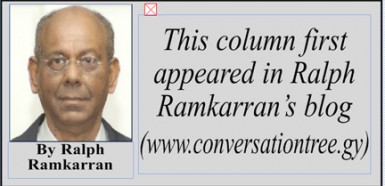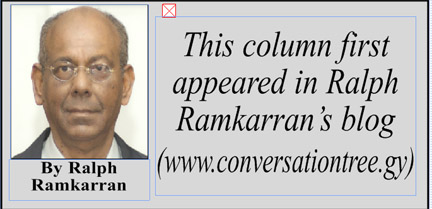The public has been gripped over the past few weeks by the evidence which has been emerging from the Commission of Inquiry (CoI) into the alleged plot to assassinate President David Granger.

Responding to concerns raised by the Opposition, Minister of State Joe Harmon is reported to have said that CoIs are used by the administration to “ferret out information, which would not necessarily be made available during regular investigations.” The Guyana Chronicle reported that it was told that the CoI “would address among other things the police’s investigation of the case.” In any event, the TOR suggest that there will be an investigation of the investigators, which must address whether there has been a dereliction of duty or failure to properly investigate the matter.
It is not known what motivations were behind the decision to hold a public, as opposed to a private, inquiry. I am not suggesting that there might have been anything sinister. But I would have thought that the danger of a public inquiry of undermining the investigators in the eyes of the public, would inevitably be the consequence of a public inquiry in view of the TOR. An internal investigation by an external agency such as the CoI, utilizing the same or similar procedures applicable to a public inquiry, might have served to elicit the same information, while at the same time protecting the Police Force.
The Guyana Police Force, particularly the Criminal Investigation Department, depends on confidentiality in relation to its methods and practices. Where these are exposed it can compromise future investigations. Those with a criminal bent are certainly paying attention to learn all they can about police methods. Apart from this, it is not clear why it is necessary to parade witnesses from outside the investigating team, and who may not have training as investigators, to publicly chastise investigators and even the Commissioner on tangential issues.
The Commissioner of Police, Mr Seelall Persaud, gave evidence, no doubt to defend himself against allegations. It does not appear that the allegations related directly to the investigation of the alleged assassination plot, but to the propriety of him requesting the release of the brother of the person under investigation, Imran Khan, who was held for disorderly behaviour, and whether or not he read the file relating to the matter.
Crime Chief Wendell Blanhum also gave evidence and gave a good account of himself. The Crime Chief does not court the press, but every time he comes under public scrutiny, his reputation soars. He spoke truth to power and was quite clear that the story of the complainant, Andriff Gillard, was ‘inherently incredible.’ Based on legal advice, he viewed the information obtained as “tenuous” and not sufficient to base legal charges. Blanhum expressed satisfaction with the investigation. The Crime Chief has been rightly praised for his work in the past. The results show that he is one of the most successful Crime Chiefs in recent memory. Even though Guyana still lives in fear of crime, there would be much public concern if there is second guessing of the work of the Crime Chief.
Former Justice of Appeal Claudette Singh, Senior Counsel, who is the Police Legal Adviser will assist the CoI. It is not known whether she will give evidence. But it appears that she advised that no charge be brought. This is not surprising, having regard to the evidence, which came out in the CoI, that the police had evidence that Andriff Gillard was making up the story. With such conflicting evidence in the police file, there would have been no hope of a conviction. In fact, based on their investigations, according to the evidence of Corporal Keion Benjamin, the Police concluded that Andriff Gillard should be charged for giving false information to the police.
The public waits anxiously for the conclusion of the CoI as to whether the investigation was adequate or not and, if so, in what areas the Criminal Investigation and Operations Departments fell down. If such is the finding, the CoI might also wish to tell us what would have been achieved if the investigation had been more thorough, having regard to the evidence by and in relation to, Andriff Gillard and the independent evidence that his story is false.
Investigations such as these ruin careers. Let us hope that the Police Force and its able and dedicated officers survive unscathed. High though the crime rate, they are our first and last line of defence.





